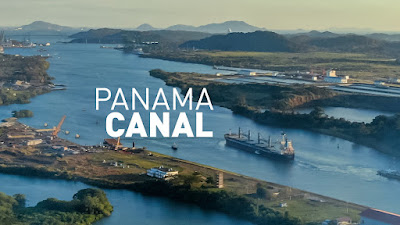Matthew Olay at the DOD News offers a piece on Defense Secretary Hegseth (seen in the below photo) at the Panama Canal:
“The era of capitulating to coercion by the communist Chinese is
over," Hegseth said while delivering prepared remarks earlier in the
day.
"[China's] growing and adversarial control of strategic
land and critical infrastructure in this hemisphere cannot and will not
stand," he added.
Hegseth, who has been in Panama City for a three-day security
conference with the host nation, later made the expanded partnership
announcement during a joint press conference with Panamanian Public Security
Minister Frank Abrego.
"The Panama Canal is key terrain that must be secured by
Panama, with America, and not China," Hegseth said.
He added that, just prior to the news conference, the U.S. and
Panama signed a memorandum of understanding related to cooperative security
activities in the region and that the signing of an additional declaration
related to the security and operation of the Panama Canal would be
forthcoming.
That declaration, Hegseth said, would provide a framework for
U.S. warships and auxiliary ships to travel "first and free" through
the canal.
"These documents reaffirm [the U.S. and Panama's] historic
ties and outline how we will deepen our relationship and strengthen bilateral
canal security cooperation," Hegseth said.
He added that the signed MOU would pave the way for an increased
level of joint training exercises between the two countries and improve overall
interoperability between both nations' military forces by reestablishing a
rotational joint presence at a handful of previously operational U.S. military
installations.
Those installations include Rodman Naval Station and Howard Air
Force Base, as well as Fort Sherman, where plans are underway to revive the
jungle operations center so that U.S. and Panamanian troops can train side by
side.
Hegseth said the expanded security relationship between the two
countries would also include information sharing, enhanced cyber cooperation,
bilateral security dialogues and canal infrastructure improvements.
"Our countries reaffirmed our shared commitment to
protecting Panamanian sovereignty from maligned influence, and we recognize the
foundational importance of our constitutional governments — including respect
for our neutrality treaty," Hegseth said.
Signed Sept. 7, 1977, the Treaty Concerning the Permanent
Neutrality and Operation of the Panama Canal stipulated that the U.S. would
relinquish control of the canal by the year 2000 while also ensuring open and
secure waterway access to all nations.
When asked whether the U.S. still recognizes Panama's
sovereignty over the canal, Hegseth said that protecting Panamanian sovereignty
from maligned influences in the region is essential.
"When President [Donald J.] Trump says, 'We're taking back
the Panama Canal from Chinese influence,' that involves partnership with the
United States," Hegseth said, adding that the U.S. is grateful that Panama
has welcomed American troops onto Panamanian soil through the joint rotational
exercise invitation.
"And that's what you'll see in the memorandum of
understanding: it's an opportunity to revive … locations where U.S. troops can
work with Panamanian troops to enhance capabilities and cooperate in a
rotational way," he said.
Presently, there are two U.S. Navy guided-missile cruisers, one
U.S. Coast Guard cutter, four F-18 fighter jets, and over 1,000 U.S. service
members — including a U.S. Marine Corps infantry company — training and
exercising with the Panamanians, Hegseth said.
He added that the U.S. Navy would send the hospital ship USNS Comfort to Panama this summer to provide medical care and deepen bilateral relationships between the two countries.
In addition to partnering to secure the Panama Canal, Hegseth said the two countries are also working in tandem to counter violent cartels and criminal enterprises throughout the Americas, as well as securing their respective countries' borders.
As an example of the latter, Hegseth credited Panama with
reducing illegal border crossings at the Darién Gap — a 60-mile land bridge
connecting Central and South America — by 99% in the past year.
Calling the expanded partnership with Panama "a golden age
of clear-eyed Americanism," Hegseth said that the U.S. and its partner
nations throughout Central and South America seek a hemisphere that is secure
and prosperous for its sovereign nations.
"We want this to be a golden age for our countries,
together, and for this hemisphere," Hegseth said. "We want — in short
— not only to make America great again, but to make the Americas great
again."
Note: I’m interested in the Panama Canal due to my late father, Edward M. Davis. Prior to my father serving in the U.S. Navy as a chief and an Underwater Demolition Team (UDT) frogman in WWII, he was a U.S. Army soldier who guarded the Panama Canal and chased bandits in the 1930s.



No comments:
Post a Comment